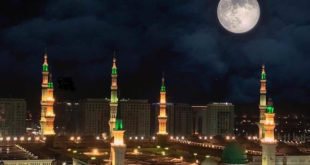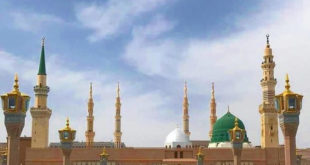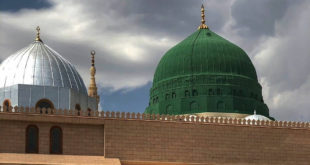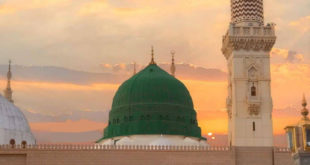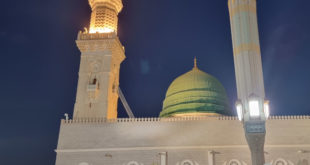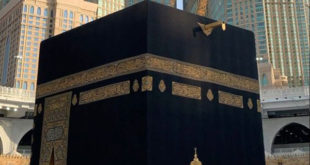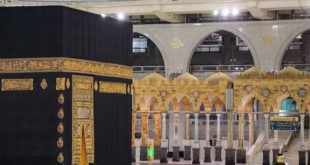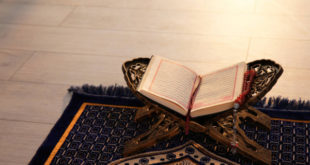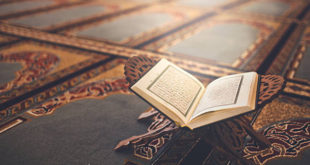Q: If a father discharges sadaqatul fitr on behalf of his wife and baaligh children without their permission, will the sadaqatul fitr be discharged? A: He should take their permission before discharging the sadaqatul fitr. However, if he did not take their permission, the sadaqatul fitr will only be discharged …
Read More »Recent Posts
May, 2013
-
21 May
Manner of discharging sadaqatul fitr for previous years
Q: If a person did not discharge his sadaqatul fitr for many years, what should he do? A: He should discharge the sadaqatul fitr for the past years. For each missed year, he will discharge the value of the current year’s sadaqatul fitr. ( تجب )… ( موسعا في العمر ) عند …
Read More » -
21 May
Giving sadaqatul fitr to a poor non-Muslim in a non-Islamic State
Q: If someone gives his sadaqatul fitr to a non-muslim in a non-Islamic State, will the sadaqatul fitr be discharged? A: The sadaqatul fitr will not be discharged. ( ولا ) تدفع ( إلى ذمي ) لحديث معاذ ( وجاز ) دفع ( غيرها وغير العشر ) والخراج ( إليه …
Read More » -
21 May
Giving sadaqatul fitr to a poor non-Muslim in an Islamic State
Q: If someone gives his sadaqatul fitr to a poor non-muslim in an Islamic state (a zimmi), will the sadaqatul fitr be discharged? A: The sadaqatul fitr will be discharged. وأما أهل الذمة فلا يجوز صرف الزكاة إليهم بالاتفاق ويجوز صرف صدقة التطوع إليهم بالاتفاق واختلفوا في صدقة الفطر والنذور …
Read More » -
21 May
Sadaqatul fitr for those who did not fast in Ramadhaan
Q: Is sadaqatul fitr only waajib on those who fasted in Ramadhaan? A: Sadaqatul fitr is waajib on those who fasted in the month of Ramadhaan as well as on those who did not fast e.g. women in the state of nifaas, the sick who were unable to fast, the …
Read More »
-
Tafseer of Surah Naazi’aat
وَ النّٰزِعٰتِ غَرۡقًا ۙ﴿۱﴾ وَّ النّٰشِطٰتِ نَشۡطًا ۙ﴿۲﴾ وَّ السّٰبِحٰتِ سَبۡحًا ۙ﴿۳﴾ فَالسّٰبِقٰتِ سَبۡقًا ۙ﴿۴﴾ …
Read More » -
The Extreme Generosity of Hazrat Talhah (radhiyallahu ‘anhu)
-
Securing the Blessings of Ramadhaan, Umrah and Hajj – The Tolerance of Rasulullah (sallallahu ‘alaihi wasallam) – The Orchards of Love – Part Seventy Three
-
Receiving the title of Al-Fayyadh from Rasulullah (sallallahu ‘alaihi wasallam)
-
Hazrat Talhah (radhiyallahu ‘anhu) Fulfilling his Pledge
-
Receiving Seventy Rewards
Hazrat Abdullah bin Amr bin Aas (radhiyallahu ‘anhuma) reported, “Whoever sends salutations upon Nabi (sallallahu ‘alaihi wasallam) once, Allah Ta‘ala and His angels will send seventy mercies and blessings upon him in return of his one Durood. Hence, whoever wishes to increase his Durood should increase it, and whoever wishes to decrease his Durood should decrease it (i.e. if he wants to earn great rewards, then he should increase his Durood).”
Read More » -
Increase in Sustenance
-
The Reward of Fasting on the Day of Arafah
-
The Angel that Stands at the Blessed Grave of Hazrat Rasulullah (sallallahu ‘alaihi wasallam) to Convey the Durood of the Ummah
-
Reciting Durood when Entering the Musjid
-
Sunnats and Aadaab of the Host – 2
2. Entertaining and hosting guests is a means of attaining great barakah (blessings) from Allah …
Read More » -
Sunnats and Aadaab of the Host – 1
-
Sunnats and Aadaab which every person needs to adhere to in his individual life – 9
-
Sunnats and Aadaab which every person needs to adhere to in his individual life – 8
-
Sunnats and Aadaab which every person needs to adhere to in his individual life – 7
-
Hazrat Ali (radhiyallahu ‘anhu) – Part Forty-One – Being Sent by Rasulullah (sallallahu ‘alaihi wasallam) to Level the Graves, Destroy Idols and Erase Pictures
Hazrat Ali (radhiyallahu ‘anhu) reports that on one occasion, Rasulullah (sallallahu ‘alaihi wasallam) attended a …
Read More » -
Rasulullah (sallallahu ‘alaihi wasallam) Approving of the Verdict of Hazrat Ali (radhiyallahu ‘anhu) – Part Forty
-
The True Ulamaa – Hazrat Ali (radhiyallahu ‘anhu) – Part Thirty Nine
-
Du‘aa for Assistance in Settling Debts – Hazrat Ali (radhiyallahu ‘anhu) – Part Thirty Eight
-
The Concern of Hazrat Ali (radhiyallahu ‘anhu) regarding Business being Conducted According to the Islamic Principles – Part Thirty Seven
 Ihyaaud Deen An Effort to Revive Deen in Totality
Ihyaaud Deen An Effort to Revive Deen in Totality





























